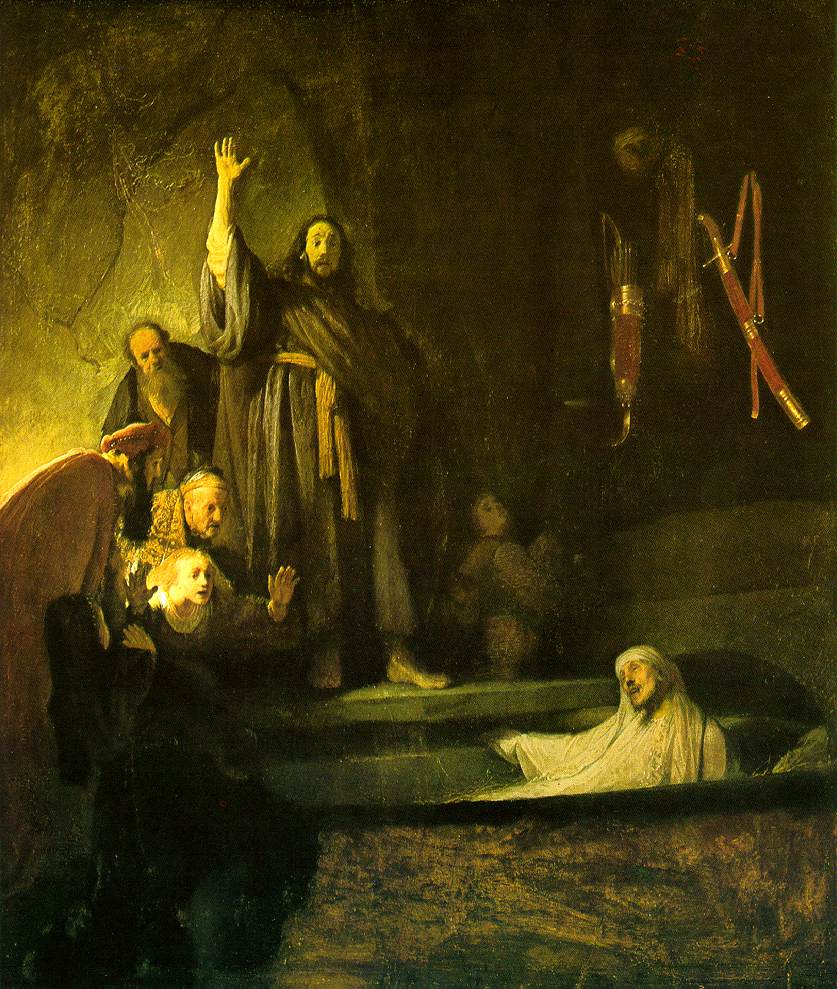“WHERE WERE YOU?” (Jn 11:1-45): 09 March 2008 (5th Sunday of Lent)
Whenever I read this gospel passage at wakes, the one line that always strikes me is Martha’s words to Jesus, which her sister Mary repeats later on: “Lord, if you had been here, my brother would not have died.” Looking around a roomful of grieving faces, I can’t help but feel that they who mourn the passing of their loved ones have the same words for the Lord: “Lord, if you had been here, my loved one would not have died!”
In other words, “Where were you, Lord? Why didn’t you save this life?”
It’s a question often asked in life and in Scripture. Perhaps the most famous man who has asked that question is Job. A prosperous, upright man, Job loses all his property and more importantly, all his sons and daughters—all in an instant. When he hears of this series of misfortunes, he rises, tears his robes, and falls to the ground, saying: “The Lord has given, and the Lord has taken away. Blessed be the name of the Lord!”
But as if to add insult to injury, he soon also develops ugly and painful sores all over his body. His grief becomes so great that when three friends visit him, they can only sit with him on the ground, and for seven days and seven nights, they say nothing to him; they can only keep silence with him as they join him in his grief.
When Job finally breaks his silence, it is not to bless the Lord, but to complain and to question God: “Why? Why have you allowed all this to happen to me, a blameless and upright man?” The entire book of Job, in fact, is practically one long, painful litany of demands for God to explain why he allows the one kind of suffering that we can’t make sense of: the suffering of innocent people. It is easier for us to understand and accept the suffering of the wicked because we can say that in a sense, they have brought that upon themselves. But the suffering of the innocent? Think Holocaust. Think 9/11. Think tsunami. Think the death of the young. All that is meaningless suffering.
“Why?” Job questions God and repeats his question almost all through the forty chapters of the Book of Job. His question is like Martha’s and Mary’s, and like ours: “Where were you, Lord, when tragedy struck? Why didn’t you save us?”
When the Lord finally speaks out of the whirlwind, he does not answer Job’s question. Instead he questions Job. He asks him: “Where were you when I laid the foundations of the earth?” And the Lord does not stop there; he continues with his own litany of questions addressed to Job: “Where were you when I created the universe, and placed the sun, stars, and moon in their places?” and so on and so forth.
God’s long series of questions has only one message for Job: “Do not question me. I know what I am doing. I am the Lord.”
In other words, the Lord turns the table on Job. And he refuses to answer Job’s question of “Why?” Instead He chooses to answer the question “Who?”—who God is.
God’s answer is found not only in the words spoken from out of the whirlwind, but most especially in the life and death of our Lord. In today’s passage, as he stood before Lazarus’ tomb, our Lord wept. Ours is not just an almighty God who shouldn’t be questioned about suffering. He is also a compassionate God who joins us in our suffering, who knows what it means to lose someone he loves–and who, like us, weeps over his losses.
So here’s a Quick Question for you today: “How do you feel about a God who stands and weeps before the grave?” Think about it, and share a thought, a feeling, or a question.
(image: “The Raising of Lazarus” by Rembrandt)
Note: Dan Schutte wrote a beautiful song called “Holy Darkness.” Here are the lyrics of the song. Click here if you want to listen to it.
HOLY DARKNESS
Holy darkness, blessed night,
heaven’s answer hidden from our sight.
As we await you, O God of silence,
we embrace your holy night.
1. I have tried you in fires of affliction;
I have taught your soul to grieve.
In the barren soil of your loneliness,
there I will plant my seed.
2. I have taught you the price of compassion;
you have stood before the grave.
Though my love can seem
like a raging storm,
this is the love that saves.
3. Were you there
when I raised up the mountains?
Can you guide the morning star?
Does the hawk take flight
when you give command?
Why do you doubt my power?
4. In your deepest hour of darkness
I will give you wealth untold.
When the silence stills your spirit,
will my riches fill your soul.
5. As the watchman waits for morning,
and the bride awaits her groom,
so we wait to hear your footsteps
as we rest beneath your moon.
